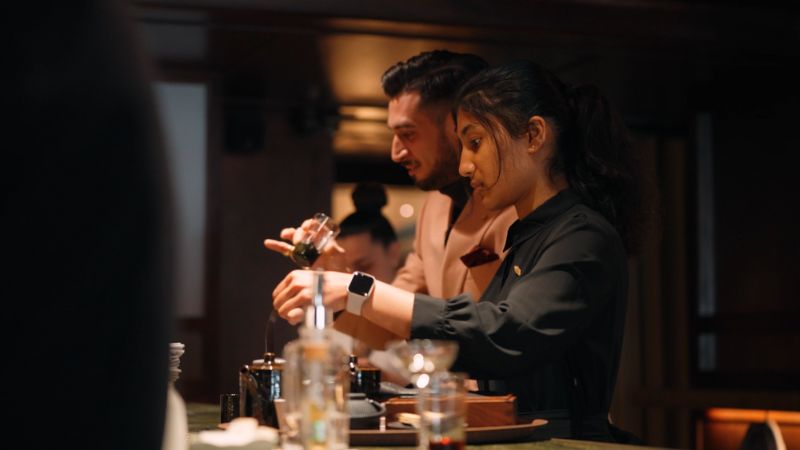UCAS code: P052162
Start dates: September 2026 / January 2027
Full time: 1 year or 2 years in sandwich mode which includes one year's full-time paid supervised work experience (a work placement).
Part time: MSc: 24 months for UK students (teaching normally structured to provide one day or two half days each week in the semester)
Location: Headington
School(s): Oxford Brookes Business School
Overview
Imagine a career where 2 days are never the same. Where you’ll meet new people, travel to new places and maybe even learn new languages. On our International Hospitality, Events and Tourism Management MSc, you’ll do exactly that.
If you want to work in hospitality, events or tourism, but aren't sure which area, this course is for you. It doesn’t matter if you don't have experience – we’ll teach you everything you need to know to stand out.
Helping you secure the job you want is really important to us. You’ll get hands-on experience through live projects and field trips, and help finding a one year paid placement. Past placement organisations include Marriott and the British Academy of Film and Television Arts (BAFTA).
Thanks to our unique Bacchus Mentoring programme, you’ll receive support from a senior professional working in the hospitality, tourism or events industry who can help you navigate your career path. We’ll also introduce you to other professionals, employers, and alumni. All of this will help you grow your network and build connections.
Why Oxford Brookes University?
-
Industry placement
We’ll help you find a paid placement so you can apply your skills and boost your employability within multinational hotels, Michelin star restaurants and exclusive clubs.
-
Unrivalled support
The Bacchus Mentoring and Leadership programme focuses on boosting your employability.
-
City of opportunity
Oxford is a global city, and we use all its distinctive aspects to provide you with unique learning opportunities.
-
Explore your options
Study all 3 areas to discover which career path is the perfect match for you.
-
Freedom to shape study
We provide an unbeatable range of modules so you can explore the areas that fascinate you.
Course details
Start this course in January or September
You can start this course in January if a September start doesn't suit you or is not currently offered for this course.
If you start in January you will study a range of modules between January and May. During the summer months of June, July and August you will study further modules and begin work on your dissertation. Between September and December you will complete your final modules and focus on your dissertation.
Study modules
Be industry ready when you graduate
By undertaking an optional work placement you can gain valuable and relevant industry experience and develop transferable skills such as communication, teamwork, networking and problem solving. A work placement can help you decide on your long-term career objectives and may lead to a job offer after graduation (would require visa sponsorship for international students).
The WAVES (Work and Voluntary Experience Service) or Careers Office will provide you with support and advice to get ahead in your career, and help you with your CV and applications. The team has access to a wide range of small, medium and large employers that offer postgraduate student work placements.
If you wish to pursue a placement at a particular company, our WAVES team can support you in making an approach to the company. Our Careers Office can also provide you with advice on how to use professional social media channels to pitch yourself to prospective employers.
Please note: As our courses are reviewed regularly as part of our quality assurance framework, the modules you can choose from may vary from those shown here. The structure of the course may also mean some modules are not available to you.
Research
96% of the research conducted by The Oxford School of Hospitality Management is internationally recognised. Our aim is to conduct research that advances academics' understanding of hospitality management.

Careers
Tourism is one of the world’s largest industries, so you’ll never be short of opportunities when you graduate. Your degree could take you anywhere in the world.
Our graduates secure a range of rewarding roles including:
- operations manager
- visitor experience manager
- hotel manager
- events manager
- food and beverage manager.
Want to expand your expertise? Completing a PhD with us is a great option if you’re eager to join the academic community or teach the next generation of industry professionals.
Student profiles
Our Staff
Dr Jackie Clarke
Jackie currently works at the Oxford School of Hospitality Management teaching on the postgraduate and undergraduate programmes across tourism and hospitality and the wider Doctoral programme.
Read more about JackieDr Rachel Wang
Rachel is a member of the Global Conference on Hospitality, Tourism, Events and Leisure Management and teaches numerous modules while supervising Postgraduate student dissertations.
Read more about RachelRelated courses
Entry requirements
Specific entry requirements
Please also see the University's general entry requirements.
English language requirements
If English is not your first language you will need to satisfy the university's English language requirements:
- minimum 6.0 (with a minimum of 6.0 in reading and writing and 5.5 in listening and speaking)
- if you have completed your undergraduate degree in the UK (at least one full year of study) you will automatically meet our English language requirements
Please also see the University's standard English language requirements.
Pathways courses for international and EU students
We offer a range of courses to help you meet the entry requirements for your postgraduate course and also familiarise you with university life in the UK.
Take a Pre-Master's course to develop your subject knowledge, study skills and academic language level in preparation for your master's course.
If you need to improve your English language, we offer pre-sessional English language courses to help you meet the English language requirements of your chosen master’s course.
English requirements for visas
If you need a student visa to enter the UK you will need to meet the UK Visas and Immigration minimum language requirements as well as the University's requirements. Find out more about English language requirements.
Terms and conditions of enrolment
When you accept our offer, you agree to the Terms and Conditions of Enrolment. You should therefore read those conditions before accepting the offer.
International qualifications and equivalences
How to apply
Application process
Tuition fees
Questions about fees?
Contact Student Finance on:
Tuition fees
The full-time fees quoted are for the taught Year 1. Fees will be charged for the placement year in Year 2 and are available on request from finance-fees@brookes.ac.uk. For approximate fee levels of the placement year see the placement fee above.
The following factors will be taken into account by the University when it is setting the annual fees: inflationary measures such as the retail price indices, projected increases in University costs, changes in the level of funding received from Government sources, admissions statistics and access considerations including the availability of student support.
How and when to pay
Tuition fee instalments for the semester are due by the Monday of week 1 of each semester. Students are not liable for full fees for that semester if they leave before week 4. If the leaving date is after week 4, full fees for the semester are payable.
- For information on payment methods please see our Make a Payment page.
- For information about refunds please visit our Refund policy page
Financial support and scholarships
For more information, please go to our Fees and Funding page
Additional costs
Please be aware that some courses will involve some additional costs that are not covered by your fees. Specific additional costs for this course are detailed below.
We offer an International Business in Practice Study Trip module. This study trip is voluntary and all costs associated with the trip will need to be funded by you.
The International Study Trip modules allow you to experience ideas and practices of global business. During the trip you will have direct interaction with management executives and practices. You will attend presentations from local management executives and experts and go on site visits to major corporations and agencies. These study trips are voluntary and you will need to fund most of the costs associated with the trip. We have run study trips to Boston, Chengdu, Kuala Lumpur and Budapest.
As an example of costs, the fees in 2020 varied between £350 - £1500 and included: accommodation for seven nights, insurance, company visits and group transportation for all activities. This fee did not include international airfare, visa application fee (if relevant), dinners and activities during your free time.
Programme changes:
On rare occasions we may need to make changes to our course programmes after they have been
published on the website. For more information, please visit our
changes to programmes page.

